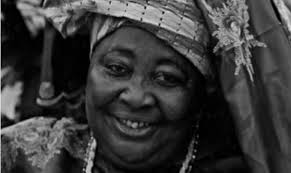Born on the 15th of February 1933, Gambo Sawaba was in the category of the pioneer women activists, philanthropist and politicians.[1]
Background: Early Life and Education

36NG
Born to an immigrant Father of Ghanian Descent,-Isa Amartey Amarteifio, and a Nigerian mother of the Nupe tribe in Niger state. Gambo’s mother, Fatima was already a widow with three children at the time Isa Amartey married her. Their marriage was consummated with six children of which Gambo,-called Hajaratu at birth-was fifth, born after a set of twins; thus informing the name; Gambo. The name Gambo, according to Hausa naming customs, is the name given to any child-male or female, born after the birth of twins. Her name therefore was Hajaratu Gambo.[2]
Gambo’s educaton began at the Native Authority Primary School in Tudun Wada, though this schooling was truncated by the deaths of her father and mother in 1943 and 1946 respectively. Gambo was soon married off at the age of 13 to a World War II Veteran, Abubakar Garba Bello, who left and never returned after her first pregnancy.
Gambo: Power to the Powerless, Fighter for the Fainthearted
As a child, it was remarked that Gambo had an unusual interest in mad people and often spoke with them, accommodated some, gave money to some, clothed and also fed them as much as she could. But in extension to that, Gambo was a fighter; she was regarded as a stubborn child and was very heady, usually getting into street brawls.[3] According to her, “I could not stand to watch a weak friend or relation being molested,” she literally would take over the fight once she got to the scene by saying, Toh na sa ya rigiman da ga nan’ to the weaker person. (Meaning ‘I have bought the fight from you’).
Gambo: Lionhearted
During the time of Gambo’s rise, Northern women were usually seen as part of the oppressed in the society; usually voiceless. Even though Gambo was married off very early, she joined active politics at an early age of 17. Irrespective that the most dominant political party in Northern Nigeria at that time was the Northern People’s Congress, which had the support of the Emirs and the British Clonial Authority, Gambo opted to join the Northern Element Progressive Union. She spoke strongly and campaigned against under aged marriage, forced labour and advocated strongly for western education in the north. In fact, she is widely regarded as the pioneer of fighting for the liberation of Northern women.[4] Gambo became a force to be reckoned with when she boldly addressed a room full of men, during a political lecture, during her political career in the north.
At different times of her life, Gambo was sent to jail and often times was brutalized by the security forces concerned. Some of those arrests were due to her resilience to involve the women folk, who were not allowed to attend political activities. At one time, Gambo alongside two hundred other women were given a one-month jail sentence for having an assembly without a permit.
Having evolved through series of challenges and obstacles, coming forth from the feminine obscurity to become a beacon of light for women emancipation, Gambo Sawaba is a name worth worth knowing and a name worth remembering.
Gambo died in October 2001. As a memoriam, a general hospital was named after her in Kaduna state, Nigeria.
[1] Paul, Mamza.”Nigeria’s Unsung Heroes (10), Feminsm As A Prowess: The Profile of Chief (Mrs.) Margaret Ekpo and Hajiya Gambo Sawaba,” Gamji.
[2] Kwemum, Rima. The Gambo Sawaba Story, (2nd Ed.) (Abuja:Echo communication, 2004), 52.
Featured image source: women.NG

